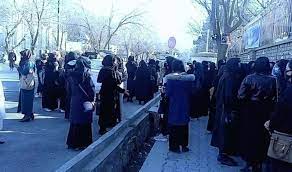KABUL (Khaama Press): Women’s lives in Afghanistan have been severely restricted due to the imposed limitations. They are not allowed to work or pursue education in their own country. According to conducted research, they have not only become victims of crimes against humanity but have also been deprived of access to justice within the Taliban administration’s judicial system.
This has led to widespread migration of women from the country. In this report, you will read the story of a girl who left Afghanistan after being prohibited from studying and working.
Khalida is now 23 years old. She left Afghanistan after the return of the Taliban, a place she described as having taken away her dearest loved ones, and now she grapples with an uncertain future in Pakistan. Khalida says, “I left Afghanistan, perhaps for a few years or forever.”
She was studying at a university and also working at a telecommunications company in Afghanistan before the rise of the Taliban rule in the country. Through her job and education, she was able to support herself financially. However, following the political changes in Afghanistan, she joined the thousands of girls who had to leave their homes, families, friends, and universities behind.
Khalida lost both her parents in a devastating explosion in Kabul about 8 years ago when she was just 16 years old. She says, “I lost my mother and father on the same day, at the same moment, when I was 16.”
What compelled Khalida to leave her homeland and face an uncertain and unknown future? She says, “I lost the dearest people in my life in Afghanistan, and I never thought of leaving, but the prohibition on studying and working didn’t allow me to stay in Afghanistan.”
The ban on women working and studying, often enforced through coercion and force in Afghanistan, has affected various aspects of women’s lives in the country. They have been deprived of any financial and educational independence. According to the Khaama Press public poll, after the rise of the Taliban, the status and influence of women within families have also been significantly impacted, leading to a noticeable reduction in women’s agency within the family structure.
Khalida believes strong individuals always emerge from a sea of difficulties and hardships.
After losing her parents, she tried to become self-sufficient and considered herself responsible for her dreams with each passing day. She made every effort to achieve what she wanted, but the arrival of the Taliban administration rendered all her efforts in vain. She says, “I tried to stay strong in the face of challenges, but in an Afghanistan ruled by the Taliban, even the smallest movement was denied to me, and I had to escape.”
Ultimately, she left behind half of her family members and went to Pakistan with her younger sister, who was already married.
The challenges of migration: Khalida’s story
Khalida says, “When leaving Afghanistan, I felt like I was carrying half of my existence, which made the journey burdensome. All migrants understand that they must travel light, leaving behind half of themselves, including their homes, families, friends, and universities.”
Reports from Pakistan suggest that cases of abortion among migrants with immigration cases have significantly increased, as the birth of an unplanned child can complicate immigration proceedings.
Khalida’s younger sister had an immigration case for the United States, but she was forced to leave her newborn child with Khalida, a standard narrative among migrants.
Taking care of a six-month-old child is not difficult for a girl who has experienced the bitterness of motherlessness in her childhood. However, for Khalida, who values work and education, assuming responsibility for the six-month-old child has created a series of challenges in continuing her life.
Khalida summarises migration and its hardships in one sentence: “Migration is a punishment.”
She not only fears deportation but also had an encounter with thieves who took everything she had when returning home from work one day.
She was transferred to a hospital with the help of local people.
In response to the recent decision by the interim government of Pakistan to expel Afghan migrants, Khalida expresses her fear and spends most of her time in a room with a window, along with other migrant girls.
Khalida has access to all the necessary financial resources in Pakistan. Still, the uncertainty, forced deportation, and the feeling of being a foreigner in another country have subjected her to severe mental challenges.
We attempted to speak with Khalida in the room they shared in Pakistan. She said, “Khalida had long hair, and nothing is more important for a girl than her hair. However, amid worsening mental struggles, one day she picked up the scissors unusually and cut her hair shorter than usual with her own hands.”
Khaama Press’s findings, conducted through conversations with migrant girls, reveal that the prohibition on women working and pursuing education in Afghanistan serves as the primary catalyst for families’ decision to migrate.







